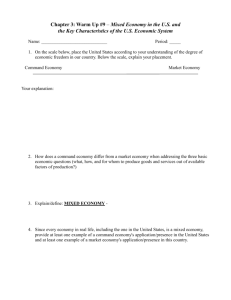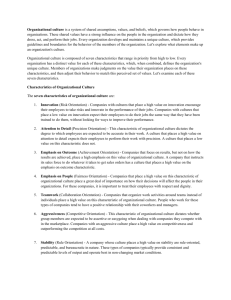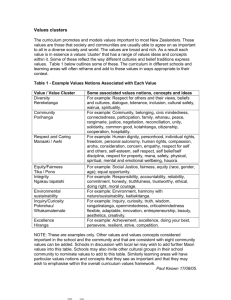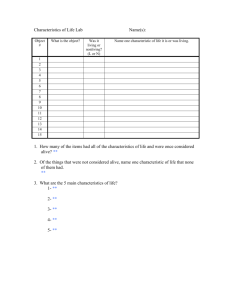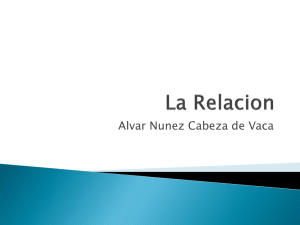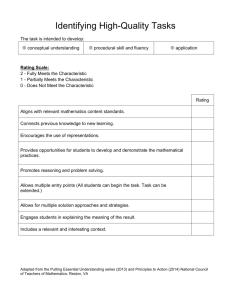Controlling Change by Science
advertisement
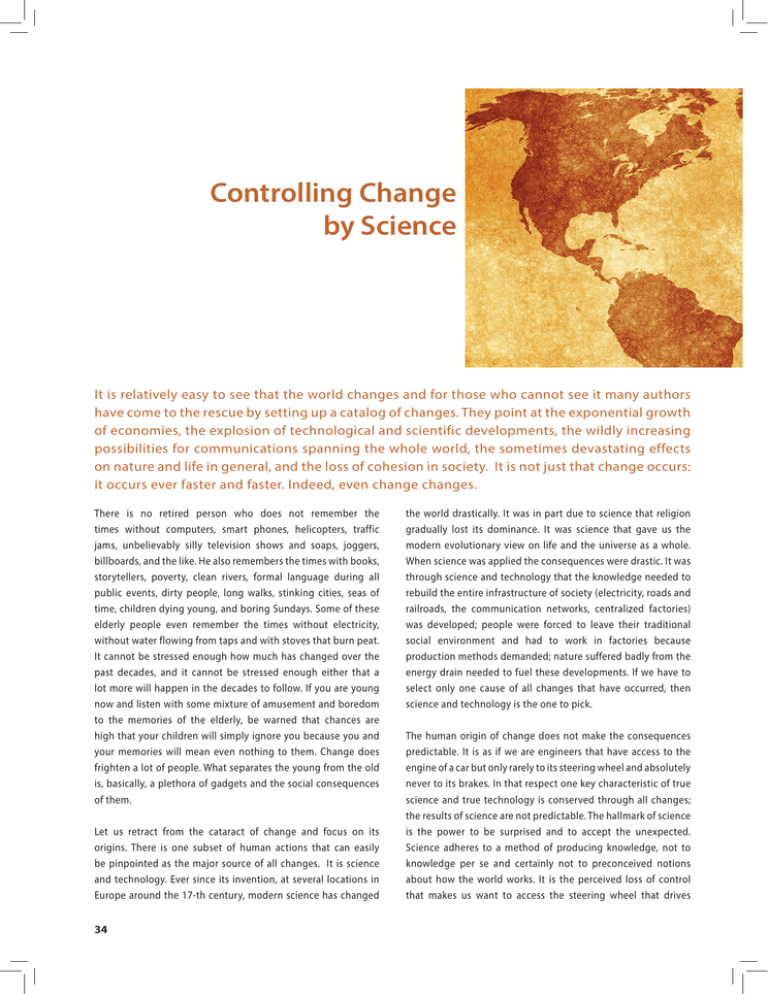
Controlling Change by Science It is relatively easy to see that the world changes and for those who cannot see it many authors have come to the rescue by setting up a catalog of changes. They point at the exponential growth of economies, the explosion of technological and scientific developments, the wildly increasing possibilities for communications spanning the whole world, the sometimes devastating effects on nature and life in general, and the loss of cohesion in society. It is not just that change occurs: it occurs ever faster and faster. Indeed, even change changes. There is no retired person who does not remember the times without computers, smart phones, helicopters, traffic jams, unbelievably silly television shows and soaps, joggers, billboards, and the like. He also remembers the times with books, storytellers, poverty, clean rivers, formal language during all public events, dirty people, long walks, stinking cities, seas of time, children dying young, and boring Sundays. Some of these elderly people even remember the times without electricity, without water flowing from taps and with stoves that burn peat. It cannot be stressed enough how much has changed over the past decades, and it cannot be stressed enough either that a lot more will happen in the decades to follow. If you are young now and listen with some mixture of amusement and boredom to the memories of the elderly, be warned that chances are high that your children will simply ignore you because you and your memories will mean even nothing to them. Change does frighten a lot of people. What separates the young from the old is, basically, a plethora of gadgets and the social consequences of them. Let us retract from the cataract of change and focus on its origins. There is one subset of human actions that can easily be pinpointed as the major source of all changes. It is science and technology. Ever since its invention, at several locations in Europe around the 17-th century, modern science has changed 34 the world drastically. It was in part due to science that religion gradually lost its dominance. It was science that gave us the modern evolutionary view on life and the universe as a whole. When science was applied the consequences were drastic. It was through science and technology that the knowledge needed to rebuild the entire infrastructure of society (electricity, roads and railroads, the communication networks, centralized factories) was developed; people were forced to leave their traditional social environment and had to work in factories because production methods demanded; nature suffered badly from the energy drain needed to fuel these developments. If we have to select only one cause of all changes that have occurred, then science and technology is the one to pick. The human origin of change does not make the consequences predictable. It is as if we are engineers that have access to the engine of a car but only rarely to its steering wheel and absolutely never to its brakes. In that respect one key characteristic of true science and true technology is conserved through all changes; the results of science are not predictable. The hallmark of science is the power to be surprised and to accept the unexpected. Science adheres to a method of producing knowledge, not to knowledge per se and certainly not to preconceived notions about how the world works. It is the perceived loss of control that makes us want to access the steering wheel that drives Academic Forum all change. And science seems to be the ideal tool to manage change. Precisely because science prefers method above knowledge, it has become a great problem solving tool. There is some reason therefore to believe that we can at least manage the consequences of change and actually reach the steering wheel of change by using science. The same method applied under the same circumstances, leads to the same result. That is the defining characteristic of an experiment, and it is also the characteristic that makes technology predictable. In a scientific context the repeatability of an experiment makes theories trustworthy (if at least the theory predicts the observed results), in a technological context this characteristic is what makes problem solving a trustworthy process. If the result is a desired one, the problem is solved. In short: the power of science can be used to harness the power of science. So far so good, it seems. The changes come to us as a set of problems and opportunities and solving the problems or realizing the opportunities is what science and technology is asked to do. The literature is filled with suggestions on how to manage innovation and knowledge, on how to make people creative in using science and technology (and, admittedly, a few other things space forbids me to speak about) with the single aim of realizing the problem solving potentials of science. Governments too tend to prefer (more and more) to give grants to those parts of science that may play a role in the management of change. It is a rare application for a grant that does not magnify (often to absurd proportions) the usefulness of the results that will be obtained. than a problem solving technique. Precisely because its methods do lead to new perspectives on the world, on man and on the universe, it is tool for freedom too, a tool that may liberate us from preconceived notions and that may force us to rethink our existence. Science did that may times. It replaced religious dogmatism by an open view on the laws of nature, evolution theory made us friends with apes, and theoretical physics gave us new perspectives on time, space and free will. Constraining science to the role of problem solver, as governments, knowledge managers and entrepreneurs tend to do, is throwing away one good element of change: the liberation from preconceived notions. It is also this liberation that can connect the generations. World views evolve much slower than practical applications and gadgets. Your children may be able to understand your world view, while using gadgets that you can’t possibly master. Change may allowed to be fast if only we let science also fulfill its role as a liberator. We need pure science and we do need philosophy if we want to understand our parents and our children. We need to liberate science from the desire to control change. Text by Henk Ellerman Understanding Society Academic Forum where science meets society and life Expand your horizon, take the time to reflect www.tilburguniversity.edu/academicforum But we face a real problem. Science has been and is much more Asset Magazine 35
